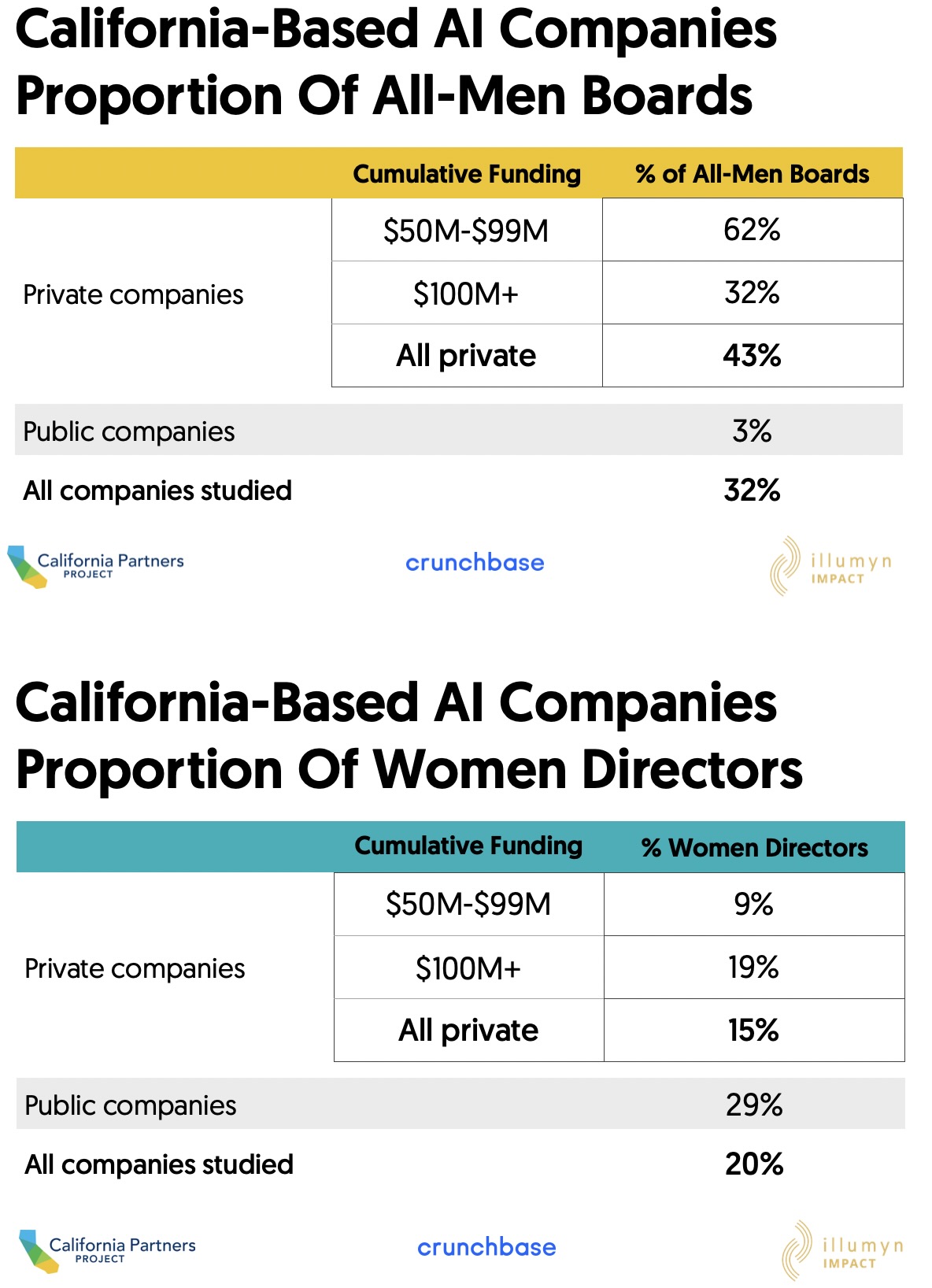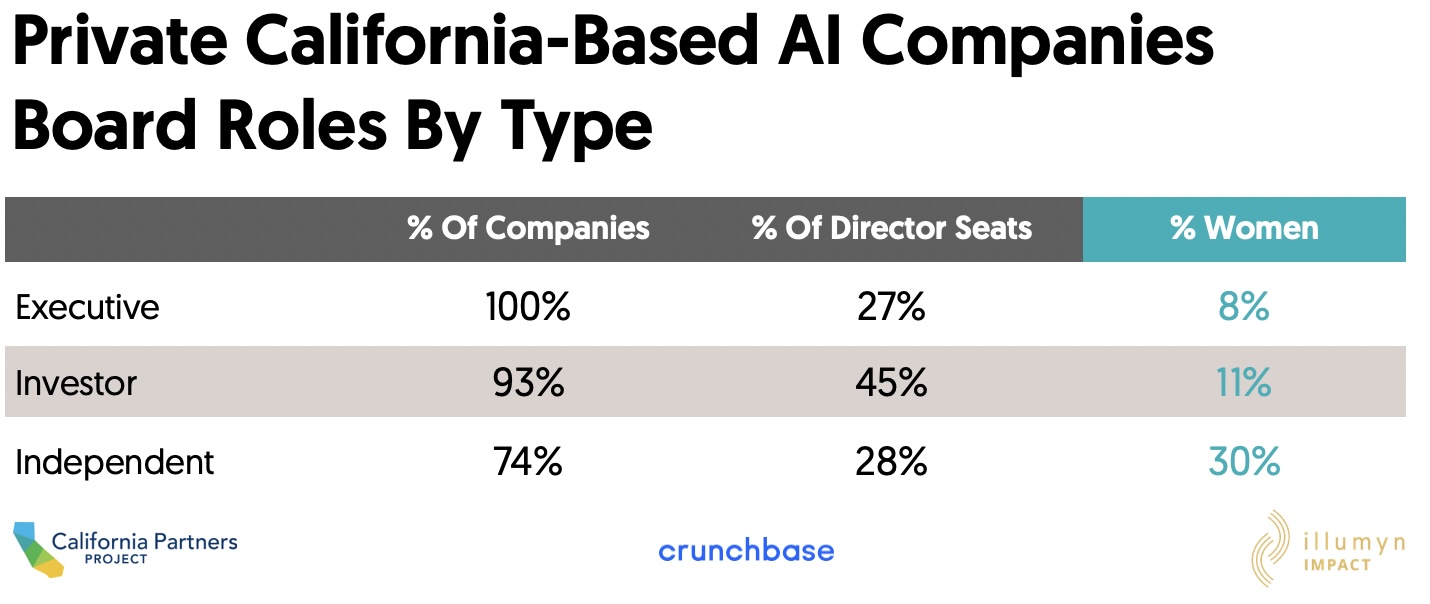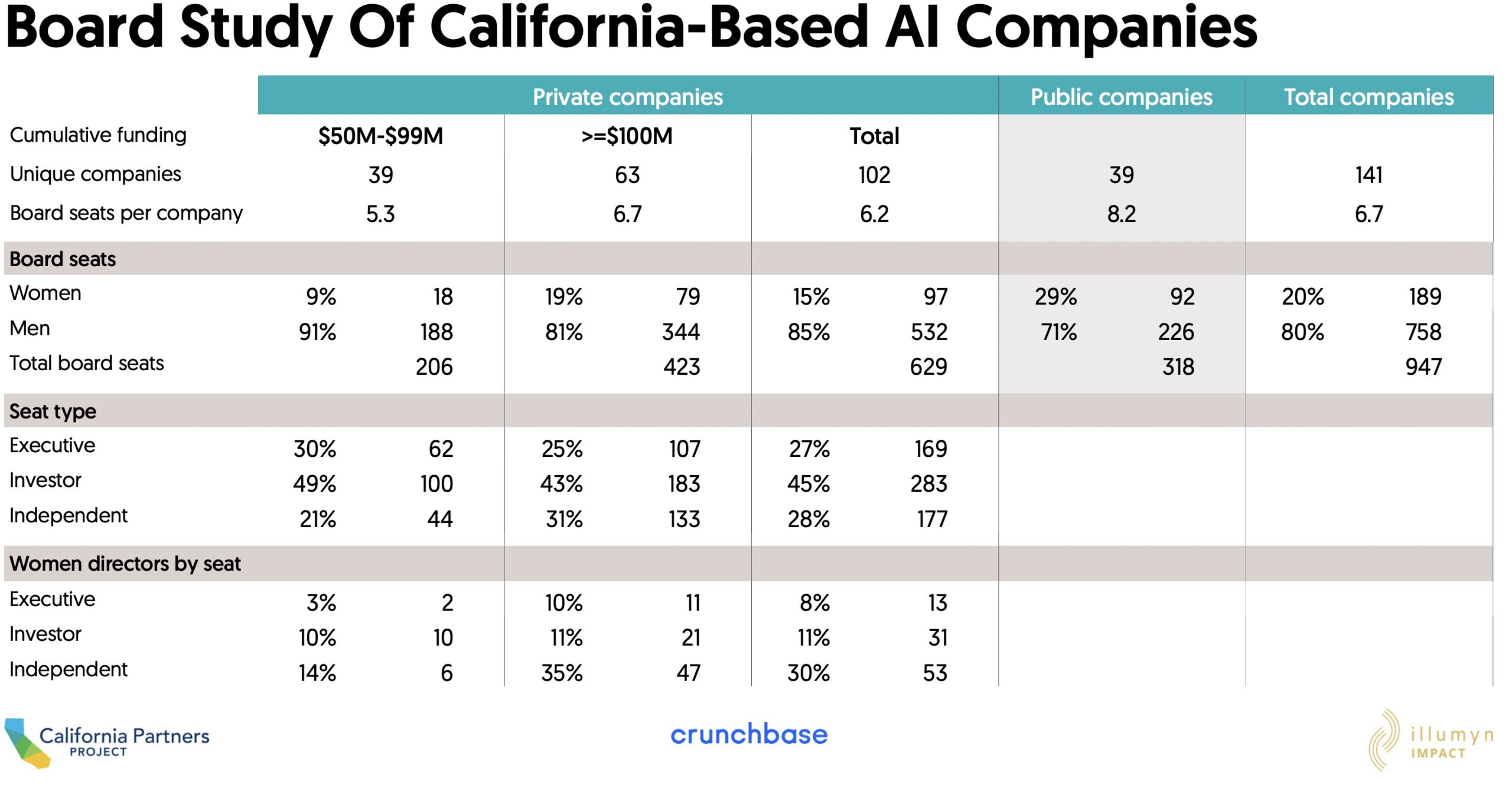By the California Partners Project, Crunchbase and illumyn Impact
This report was produced through a collaboration between the California Partners Project, illumyn Impact and Crunchbase.
Executive summary
If social media has taught us anything, it’s that new technologies can have widespread and often unanticipated effects. They can change not only how we work but also how we think and how we relate to each other.
Artificial intelligence has an unprecedented potential to shape our future in exciting and unforeseeable ways. As business leaders and government agencies around the world grapple with the responsibility of managing the risks that accompany the promised rewards of AI, one immediate and evidence-based place to start is building a diverse board of directors. Yet our research indicates that, on that front, AI company boards fall woefully short.
Boards that fail to reflect a wide range of experiences and viewpoints are not well-positioned to oversee companies whose products may determine how bank loan applications are evaluated, how healthcare issues are diagnosed, or how educational resources are allocated. Although no single measure can ensure responsible AI development, diverse board leadership is vital for companies creating technologies that will fundamentally reshape how we live, work and interact.
Within this study, we look at gender diversity, which is reasonably measurable, as a proxy for diversity of perspectives, life experience, areas of expertise and other demographics. To understand the gender mix on AI boards, we analyzed the board composition of more than 140 AI companies headquartered in California, where venture-backed AI development is concentrated. Our study focused on 102 private companies that have raised at least $50 million in cumulative funding. As we’ve seen time and again, transformative innovations are as likely to come from today’s nascent startups as they are from established industry leaders. Governance of these companies during their high-growth, pre-IPO period is arguably as important as it is after they go public. We also looked at the boards of 39 publicly traded AI companies for comparative purposes.
Our analysis revealed a striking lack of gender diversity among the people who govern some of the world’s most influential AI startups. Women comprise only 15% of the boards of private AI companies. More than 40% of these private boards don’t have any women directors.
Two root causes contribute to this gender disparity — one structural and one behavioral. First, investors and founders collectively hold the majority of private company board seats, and women are still underrepresented in those categories. Second, when appointing independent directors, boards often limit their consideration to familiar candidates instead of seeking qualified experts outside their immediate networks.
The good news: There are plenty of executive women and people of color on the cutting edge of AI innovation who are ready to bring their voices and operating expertise to the boardroom.
Companies that prioritize building a diverse board need only to look beyond their existing networks to find a wealth of AI board talent. Consider this precedent: Five years ago, one-third of all public companies in California had no women board members. With focus and effort, all-male boards are now the rare exception.
Given the rapid pace of AI development, companies need to act now, while the technology and its applications are still emerging. CEOs and board members who bring more women and people of color into their boardrooms will help create a productive and healthy AI-powered future for all of us.
Key findings
Among the AI companies headquartered in California included in our study:
- 15% of private company board members are women;
- 43% of private company boards don’t include any women directors;
- Women who serve on private company boards are most likely to hold an independent director seat;
- 26% of private company boards don’t include any independent directors; and
- Publicly traded companies typically have more gender-diverse boards than private companies, but still average only two women per eight-person board.
Women average just one seat in AI boardrooms
Across all of the California-based AI private companies studied, women hold an average of one seat on a six-person board. Among 102 private companies, only five boards (5%) have an equal or greater number of women than men in the boardroom.
More than 40% of private AI companies have all-male boards
Among the over 100 privately held AI companies headquartered in California included in our study, 44 (43%) don’t have any women in the boardroom.
Gender diversity is slightly higher on the boards of companies with more capital. Among those with cumulative funding of at least $50 million but less than $100 million, 62% have all-male boards. For companies with at least $100 million in funding, that number drops to 32%. This shift likely stems from the addition of independent directors who bring operational and market expertise.
Among publicly traded companies, women hold an average of two board seats, double the average among private company boards. Research suggests that, to capture the full economic benefits of diversity, boards should include at least three women directors. Just half of the public companies we studied meet that threshold.

For private company boards, independent director appointments offer the fastest route to diversity
Most private company board seats (72%) are held by company executives (the CEO and co-founders, typically) and early investors. Women hold only 10% of these board seats, a reflection of the underrepresentation of women among venture capital investors and the entrepreneurs they fund. Women hold less than 20% of investing partner roles in venture capital firms. Companies with women-only founders secured just 3% of AI venture funding in 2023, a number stagnant since 2015.
More than half (55%) of the women directors included in our study hold independent board seats. That is, they are neither tied to the company’s founding or management team nor investors in the company. Whereas public companies must have a minimum number of independent directors, private companies have no such requirements. Therefore, independent directors are typically added later in a company’s lifecycle, often as part of preparation for an IPO. The percentage of companies without any independent directors decreases as the level of funding increases — from 36% for those with $50 million to $99 million to 21% for those with $100 million or more.

Our findings suggest that women are more likely to be appointed to private company AI boards as the second independent director. On boards with only one independent director, women hold 17% of those independent director seats. Among companies with more than one independent director, 67% had at least one woman in that role.
Summary
Women are underrepresented on the boards of AI companies — especially high-growth, earlier-stage startups. While board diversity is not a panacea, it is one essential element for the companies developing technology with the potential to influence society in profound ways.
To increase the number of women board members, companies should:
- Accelerate the appointment of independent directors;
- Commit to adding directors who expand the diversity of perspectives, skills and experiences on the board; and
- Reach outside existing networks to identify well-qualified candidates.
Companies don’t need to trade off technical expertise and governance experience to bring diverse voices into their AI boardrooms. They simply need to look beyond their immediate networks.

Methodology
This study follows the methodology utilized in the annual Him For Her and Crunchbase studies of diversity on private company boards.
Leveraging the Crunchbase database, we identified 409 companies in the AI industry with headquarters in California. Among them were 40 publicly traded companies and 369 privately held companies with at least $50 million in cumulative funding as of July 1, 2024. To ensure that each company’s board profile was current, we included only companies that publish their board of directors on their website.
We then referenced company website data, Crunchbase profiles and other publicly available information to characterize the board members. The study included only board directors; board observers and/or advisers were excluded from the data set. For private company boards, we segmented board members according to type of board seat: executive, investor or independent. In the few cases in which founders and past executives remained on the board despite no longer having an operating role at the company, we classified them as “executive directors” in recognition of their original relationship to the company. We identified gender by referencing professional profiles on Crunchbase and, when not available, other sites.
About the authors
Co-founded by California First Partner Jennifer Siebel Newsom and Olivia Morgan in partnership with the people of California, the California Partners Project is dedicated to championing gender equity across the state and ensuring our state’s media and technology industries are a force for good in the lives of all children. The California Partners Project tracks and spotlights women’s representation on corporate boards and offers an Inclusive Boards Playbook Series developed in partnership with Stanford’s VMware Women’s Leadership Innovation Lab with strategies for board refreshment and culture-building. For more information about the nonprofit organization, visit www.calpartnersproject.org. Connect with the California Partners Project on LinkedIn and Instagram.
Crunchbase is a predictive intelligence solution that forecasts private-market movements using the unique combination of live private company data, AI and market activity from more than 80 million users. It helps investors, dealmakers and analysts be the first to find and act on opportunities. To learn more, visit crunchbase.ai and follow Crunchbase on LinkedIn and X.
illumyn Impact (formerly Him For Her) is a social impact organization with a mission to diversify the board ecosystem, which is building and shaping the future: from healthcare, to AI, to climate change and beyond. Drawing from its ever-growing referral-based talent network of 8,000+ under-networked executives, a third of whom are women of color, illumyn Impact makes highly curated introductions that bring fresh expertise into the boardroom. illumyn Impact is proud to partner with 100+ leading private equity and venture capital firms. A 501c3 corporation, illumyn Impact operates through the generosity of its founding partners GV, IVP, L Catterton, Mayfield Fund, Silver Lake Partners, SoftBank, Starboard Value and Tiger Global Impact Ventures, and supporters like Brad Feld and Amy Batchelor, Reid Hoffman, Jeff Weiner, Nasdaq and many others. Its sister organization, illumyn, supports underrepresented executives in some of the world’s largest companies through its corporate boardroom excellence fellowship program.

Stay up to date with recent funding rounds, acquisitions, and more with the
Crunchbase Daily.








